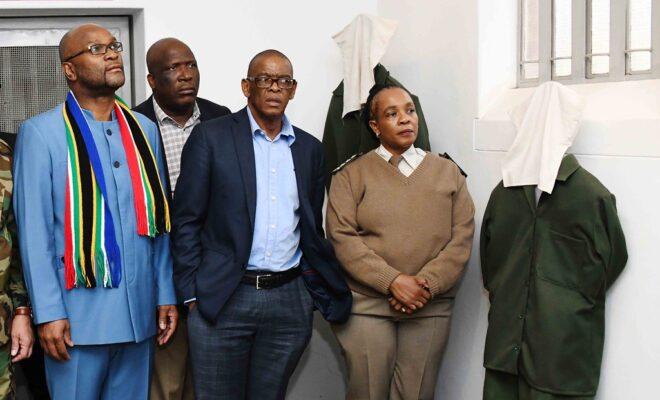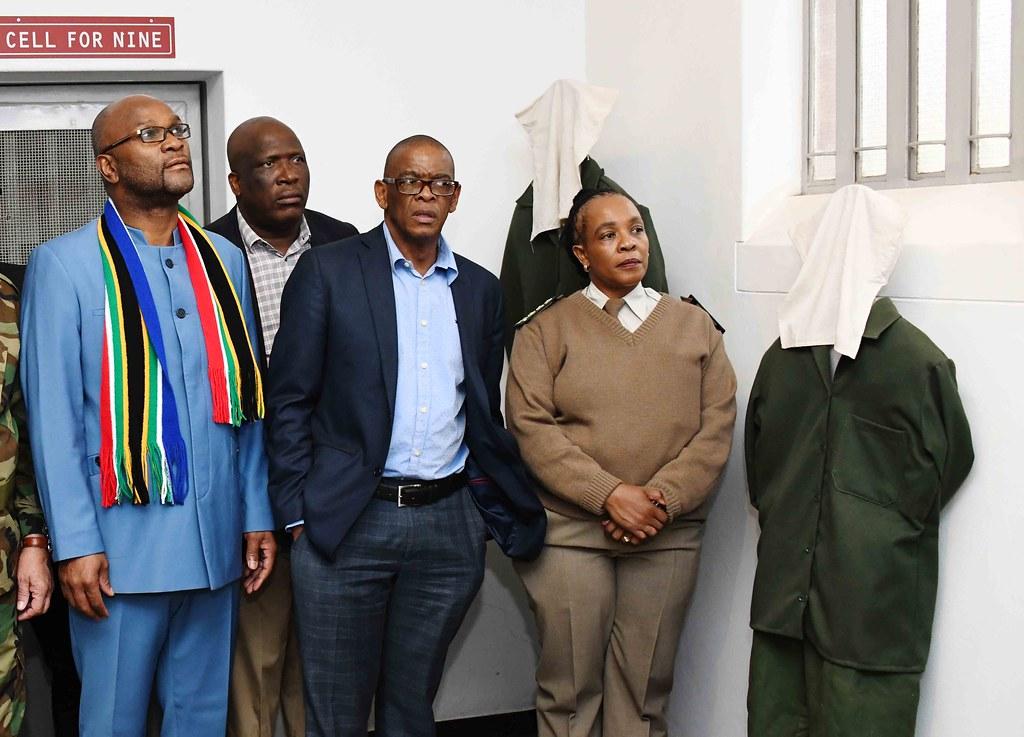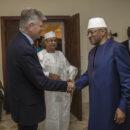Down but not out: Corruption in South Africa and the arrest of ANC’s no. 2

If convicted, Ace Magashule’s political career could be over. If acquitted, he could become politically indestructible.

ANC Secretary-General Ace Magashule (third from left) at at the 40th commemoration of Solomon Kalushi Mahlangu. Credit: : GCIS.
It is tempting to view the arrest warrant issued for Ace Magashule on 10 November 2020 as a game changer in South African politics.
The secretary-general of the ruling African National Congress (ANC) is second only to the president in the party’s hierarchy. He now faces 21 charges of corruption, fraud, and money laundering dating back to 2014 when he was the premier of Free State province. Magashule’s arrest reflects important changes under President Cyril Ramaphosa who came to power in 2018 promising to rebuild an efficient state, revive an ailing economy, attract foreign direct investment, and rehabilitate the ANC. Each of these objectives, the new leader swiftly realised, would be impossible to achieve while the rampant cronyism and plunder of state resources which characterised his predecessor’s tenure continued.
The charges against Magashule are thus part of his attempts to address corruption, though whether it will prove to have enduring significance is unclear. It would be premature to suggest that the faction of the ANC most responsible for state capture, which flourished under President Jacob Zuma, has been vanquished. They recognise that a rigorous anti-corruption campaign poses an existential threat to both their material interests and personal liberty.
Indeed, almost immediately after Magashule’s court appearance on 13 November, his camp launched a counterattack. There was a strong sense of déjà vu as his supporters borrowed extensively from Zuma’s playbook. They portrayed Magashule as the victim, claimed the charges were part of a political conspiracy by his enemies in the ANC, and suggested the ruling party has been infiltrated by spies without specifying for whom they were allegedly working.
A divided ANC
Magashule’s support network in the ANC – which overlaps substantially with those loyal to Zuma – remains a serious political force. It will mobilise support for him within the National Executive Committee (NEC) and throughout the provinces and branches. The ANC’s structures on the ground are the natural political turf of the secretary-general given that Ramaphosa, as state president as well as ANC president, is inevitably preoccupied with government business.
Magashule has insisted he will not step aside as secretary-general despite an ANC national conference decision made in 2017 and reaffirmed in 2020 that members facing charges should do so. He realises that to comply would be to surrender his power base and thus endanger his fightback. Like Zuma, he has also threatened to expose the corrupt activities of other ANC members which, in an organisation where corruption is now endemic, amounts to a threat of mutually assured destruction.
Just how potent Magashule’s counterattack proves to be depends upon the fluid balance of forces in the ANC. Ramaphosa’s position is fragile in that, while his support is reasonably broad in the country, it is not particularly deep within the ruling party. He only narrowly secured the ANC leadership in December 2017, beating Zuma and Magashule’s favoured candidate Nkosazana Dlamini-Zuma by 179 votes from over 4,700 delegates. Meanwhile, two of the NEC’s six positions are held by Magashule himself and his deputy and ally Jessie Duarte.
The possibility cannot be excluded that Magashule, like Zuma before him, will even use his supposed victim status as a platform from which to launch a campaign for the ANC presidency in 2022. Such a campaign is likely to be framed through the familiar populist discourse that the party needs to be recaptured from agents of “white minority capital” and enemies of “radical economic transformation”.
Magashule’s prospects
Magashule faces a critical reckoning. A successful prosecution could end his political career. An acquittal could burnish his radical credentials and make him seem politically indestructible. That might not be enough for him to defeat Ramaphosa – Magashule lacks the popularity or diverse support that previously powered Zuma, while Ramaphosa has not generated the intense opposition of Zuma’s predecessor, Thabo Mbeki – but it could make the secretary-general a kingmaker.
While there may be no great love for Magashule, there may be even less for a crusade against corruption in a party where the moral rot runs deep and extends well beyond the secretary-general and his support base. It is one thing to support an assault on a rival faction in the name of tackling corruption. Among other things, that may create more room at the trough of state resources.
However, it is quite another to support a genuine campaign against graft which may expose one’s own schemes and scams. Such a campaign could generate fierce resistance to Ramaphosa with the defence of material interests cloaked in the language of ideological or political difference to provide a veneer of respectability. While the faction of the ANC most closely identified with state capture and corruption may currently be down, both it and the forces of corruption more generally are still far from out.






online pharmacy pharmacy technician online certification u s a online pharmacy pharmacy rx world com ’
valsartan hydrochlorothiazide 160 12.5 quinapril hydrochlorothiazide lisinopril fatigue lisinopril blood pressure ’